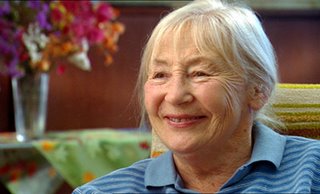 So, I watched this documentary the other night, Mademoiselle and the Doctor. It follows two people: 79 year old Lisette Nigot, and Dr. Philip Nitschke. More specifically, Lisette wants to die, and she wants Dr. Nitschke's help.
So, I watched this documentary the other night, Mademoiselle and the Doctor. It follows two people: 79 year old Lisette Nigot, and Dr. Philip Nitschke. More specifically, Lisette wants to die, and she wants Dr. Nitschke's help.
Dr. Nitschke is sometimes known as the Australian "Dr. Death", and when assisted suicide was briefly legalized in Australia in the mid-90s, he was the first person in the world to legally administer euthanasia. Now that it's ILLEGAL again, he holds workshops, designed to give legal and medical advice on dying with dignity.
Lisette is healthy, she's not depressed and is not in any pain. She just feels that at 79, she's just lived as long as she wants to. She never married, nor had children. She talks about attending the Sorbonne during WW2, working in the PR department of the Waldorf Astoria during the 1950s, and nonchalantly drops names like the Duke and Duchess of Windsor, The Kennedys and Marilyn Monroe. She also implies that she had many lovers, but not any that she had any great love for. She was very intelligent, quick, and not sentimental in the least. I liked this woman A LOT.
Your enjoyment of this film depends on a couple of factors: Obviously, you have to be the type of person who can find entertainment in a documentary-I've known many people who outright refuse to watch them. Secondly, it helps if you're not extremely anti-assisted suicide. Personally, I've never given it much thought, but after watching this movie, I've developed somewhat of an opinion.
There's one man in the film, who is dying of bowel cancer. I believe he was around 66 years old. He LOOKED like he was about NINETY six. He could not eat anything, he was in constant pain, and was unable to move from his hospital bed. He was begging to die, and it seemed to me that they were torturing this man by making him live.
Towards the end of the film, Dr. Nitschke goes to California for a convention for proponents of euthanasia. Natually, there were quite a number of protesters, and he had to hire a bodyguard to protect him (not going to touch on the irony of having to have someone protect a person from being killed by people who are against ending life. Not gonna say a word.) One of the genius protesters postulates that, once they start legalizing voluntary euthanasia, naturally they will want to legalize INvolunatary euthanasia. Yeah, chief, that's precisely what they have in mind. Yeesh.
Semi-spoiler coming up:
Lisette succeeds in commiting suicide. As much as I hate to admit it, I actually cried a little bit. She left a note, and a message on her answering machine:"I'm sorry, Lisette has gone on a trip and will not be returning." Her death ignited even more controversy in Australia, adding questions to the euthanasia debate about who EXACTLY should have the right to die-only sick people, or everyone. I'm not going to say what I think about that, one way or the other, but I highly recommend this movie.
21 minutes ago

|